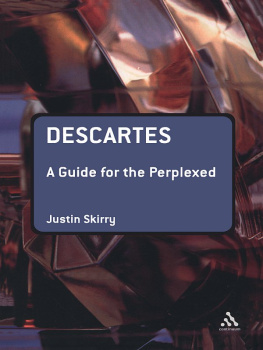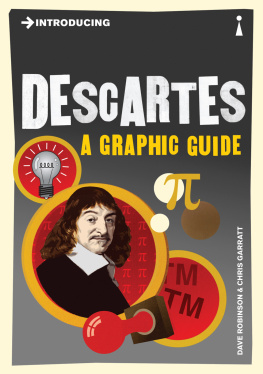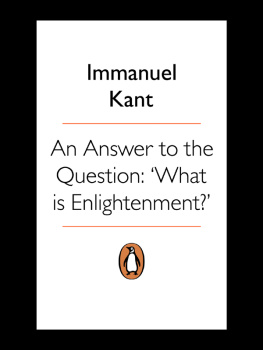Ren Descartes
Meditations
TRANSLATED BY DESMOND M. CLARKE
PENGUIN BOOKS GREAT IDEAS
PENGUIN BOOKS
Published by the Penguin Group
Penguin Books Ltd, 80 Strand, London WC2R 0RL , England
Penguin Group (USA) Inc., 375 Hudson Street, New York, New York 10014, USA
Penguin Group (Canada), 90 Eglinton Avenue East, Suite 700, Toronto, Ontario, Canada M4P 2Y3
(a division of Pearson Penguin Canada Inc.)
Penguin Ireland, 25 St Stephens Green, Dublin 2, Ireland (a division of Penguin Books Ltd)
Penguin Group (Australia), 250 Camberwell Road, Camberwell, Victoria 3124, Australia
(a division of Pearson Australia Group Pty Ltd)
Penguin Books India Pvt Ltd, 11 Community Centre, Panchsheel Park, New Delhi 110 017, India
Penguin Group (NZ), 67 Apollo Drive, Rosedale, North Shore 0632, New Zealand
(a division of Pearson New Zealand Ltd)
Penguin Books (South Africa) (Pty) Ltd, 24 Sturdee Avenue, Rosebank, Johannesburg 2196, South Africa
Penguin Books Ltd, Registered Offices: 80 Strand, London WC2R 0RL , England
www.penguin.com
Taken from Meditations and Other Metaphysical Writings
Published in Penguin Classics 1998
This selection published in Penguin Books 2010
Copyright Desmond M. Clarke, 1998, 2000
All rights reserved
Except in the United States of America, this book is sold subject to the condition that it shall not, by way of trade or otherwise, be lent, re-sold, hired out, or otherwise circulated without the publishers prior consent in any form of binding or cover other than that in which it is published and without a similar condition including this condition being imposed on the subsequent purchaser
ISBN: 978-0-14-195719-7
Ren Descartes
15961650
Preface to the Reader
I have already briefly discussed questions about God and the human mind in the Discourse on the Method for Guiding Ones Reason and Searching for Truth in the Sciences, published in French in 1637. I did not intend to discuss them in detail in that book, but simply to provide an introduction and to learn from readers reactions how they should be presented subsequently. I thought that these questions were so important that they should be discussed more than once, and that the way in which I explain them is so novel and so different from what is usually done that it was unhelpful to teach it in greater detail in a book written in French and available to be read by everyone, lest minds even less gifted than mine might believe that they should follow the same path.
Although I asked in the Discourse that anyone who found anything objectionable in my writings should kindly bring it to my notice, only two objections worth mentioning were raised concerning these questions, to which I will now reply briefly before undertaking a more detailed explanation.
The first objection is: from the fact that the human mind reflecting on itself does not perceive itself as anything other than a thinking thing, it does not follow that its nature or essence consists merely in the fact that it is a thinking thing, where the word merely excludes everything else that might also be said to belong to the nature of the soul. I reply to this objection that, in that context, I did not wish to exclude other things with respect to the truth of the question (which I was not discussing at that stage) but merely with respect to my own perception. Thus what I meant was: I did not discover anything clearly that I knew belonged to my essence except that I was a thinking thing or a thing that possesses in itself a thinking faculty. I will show below how, from the fact that I do not know anything else that belongs to my essence, it follows that nothing else does in fact belong to it.
The other objection is: from the fact that I have within me an idea of something which is more perfect than me, it does not follow that the idea itself is more perfect than me and, much less, that the reality which the idea represents exists. I reply that the word idea is equivocal here. It can be understood either materially, as an operation of the intellect and, in this sense, it cannot be said to be more perfect than me. Or it can be understood intentionally, as the thing represented by the idea and, even if this thing is not assumed to exist outside the mind, it may be more perfect than me with respect to its essence. But how, from the fact that I have an idea of something which is more perfect than me, it follows that this thing really exists, will be explained in detail below.
Apart from those two objections, I also saw two fairly long pieces that challenged my conclusions rather than my reasoning on these questions, by means of arguments borrowed from standard atheists sources. Since such arguments cannot have any influence on those who understand my reasons, and since many peoples judgements are so perverse and foolish that they are more convinced by the first views they hear, no matter how false and unreasonable they are, than by a true and sound refutation which they hear later, I do not wish to reply to these objections here lest I be the first to report them. I will say simply, in general terms, that all the things commonly invoked by atheists to challenge the existence of God always depend either on falsely attributing human affections to God, or on arrogating so much power and wisdom to our minds that we try to determine and comprehend what God can and should do. Therefore, as long as we remember that our minds should be considered finite but that God is infinite and incomprehensible, they will not pose any difficulty for us.
Now that I have finished examining the judgements of others, I return to the same questions of God and the human mind and to the beginnings of the whole of First Philosophy, but without waiting for popular approval or a wide readership. Indeed, I would not encourage anyone to read these pages unless they are willing and able to meditate with me seriously and to detach their minds from the senses and simultaneously from all prejudices, and I know that there are few such readers. As for those who do not bother to understand the order and interconnection of my arguments but try to snipe at individual sentences, as they usually do, they will derive little benefit from reading this book. They may find an opportunity to cavil in many places, but they will not easily raise any objection that is significant or deserves a response.
However, I do not even promise to satisfy the remaining readers on all questions on their first reading, and I am not so arrogant as to believe that I can anticipate everything with which readers may find some difficulty. For that reason I initially expound, in the Meditations, precisely those thoughts by which I think I have reached a certain and evident knowledge of the truth in order to test if I might be able to convince others by the very same reasons that convinced me. After that, I will reply to the objections of some eminently intelligent and learned people to whom these Meditations were sent for comments before they were printed. Their objections were so numerous and varied that I dare hope that no objection at least no significant objection will easily occur to anyone else which they have not already raised. Therefore I repeat that readers should not pass judgement on the Meditations until they have taken the trouble to read through these objections and my replies.
Summary of the Following Six Meditations
The First Meditation introduces reasons why we can have doubts about everything, especially about material things, as long as we have no other foundations for the sciences apart from those that we have had to date. Although the usefulness of such an extensive doubt may not be apparent initially, it is extremely useful because it frees us from all prejudices, provides the easiest way to detach the mind from the senses and eventually makes us such that we cannot subject to further doubt the things that we later discover to be true.
Next page












